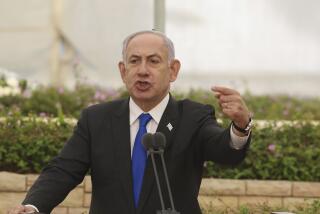Kadafi Fulfills Vow to Cede Nuclear Materials
- Share via
WASHINGTON — Making good on his promise to dismantle his nuclear weapons program, Libyan leader Moammar Kadafi put about 55,000 pounds of sensitive equipment and documents aboard a U.S. plane, which landed Tuesday in Tennessee, the White House announced.
Nuclear scientists and intelligence analysts at Oak Ridge National Laboratory were expected to pore over what could be a treasure-trove of evidence about where Libya got the components for its weapons program. U.S. officials have said they were startled by how advanced the program was, considering that Libya is technologically underdeveloped.
Libyan officials have acknowledged that Pakistan was the source for some of their nation’s nuclear know-how, but many questions remain unanswered. Diplomatic sources said the seizure in October of Malaysian-manufactured centrifuge components on a German ship bound for Libya suggested that companies from other nations might have been supplying Libya. Centrifuges are used to enrich uranium for nuclear bombs.
The German ship, BBC China, was diverted at U.S. request to an Italian port. There it was found to be carrying a large number of centrifuge components and possibly centrifuges. They had been manufactured in Malaysia for export to Libya based on a second-generation Pakistani design, diplomats said. The U.S. seized the container and its contents.
Despite such revelations, the International Atomic Energy Agency does not believe that Libya’s nuclear program is as advanced as U.S. officials have claimed, say diplomats in Vienna familiar with the IAEA findings.
“It wasn’t far enough along to even call it a program,” one diplomat said. IAEA officials in Vienna did not return phone calls Tuesday.
Officials in the U.S. and abroad are looking to the evidence being supplied by Libya to help settle questions about its nuclear program and to enable them to infiltrate illicit weapons networks worldwide. An intelligence breakthrough would be a major boon to the Bush administration’s efforts to organize a global crackdown on trade in weapons of mass destruction and their components.
Libya’s efforts to swiftly implement its promise to disarm was also an election-year diplomatic triumph for President Bush, who faces stiff Democratic attacks on his conduct of foreign policy.
It represents “the first time that the U.S. will have been able to rehabilitate what many have described as a rogue regime, primarily through diplomatic engagement,” said Flynt L. Leverett, who worked on Libya issues in the Clinton and current Bush administrations.
Aboard the military plane that arrived in Tennessee were “critical materials related to Libya’s nuclear weapons programs and ballistic missile capabilities,” including centrifuge parts, substances used to enrich uranium and ballistic-missile-guidance sets for longer-range missiles, White House Press Secretary Scott McClellan said.
McClellan said that a plane last week “brought out the most sensitive documentation associated with the Libyan nuclear weapons program.”
“The destruction of Libya’s unfilled chemical munitions has also already begun on the ground. Although these shipments are only the beginning of the elimination of Libya’s weapons,” he said, they “reflect real progress.”
In rare praise for the Libyan strongman by the Bush administration, he added, “Col. Kadafi made a courageous decision to give up his weapons, and through this transparent process, the world can see that Col. Kadafi is keeping his commitment.”
However, Secretary of State Colin L. Powell made clear last week that he still considered Kadafi a dictator. And McClellan made clear that Tripoli would not be rewarded with a quick lifting of the unilateral U.S. sanctions despite Libya’s cooperation.
On Monday, Rep. Tom Lantos (D-San Mateo) met Kadafi in Tripoli and afterward urged the administration to lift restrictions on U.S. citizens’ travel to Libya and take steps “over the next several months” to end sanctions and normalize relations if the weapons dismantling continued.
Leverett, now at the Brookings Institution, predicted that the Bush administration would boast of diplomatic progress in Libya but would wait until after the November election before taking the politically more difficult step of removing Libya from the U.S. list of state sponsors of terrorism and lifting sanctions.
The administration and its allies argue that Libya’s decision to disarm should set an example for other countries, including perhaps Syria and North Korea, to give up their weapons of mass destruction. But Leverett said the incentives and proposals that were first offered by the Clinton administration to Libya to draw Tripoli out of isolation were not being offered to Damascus or Pyongyang.
“It was decided early on after 9/11 that we are not going to do carrots with rogue regimes,” Leverett said. “Unless they change that position, I don’t think this [Libyan disarmament] can be a turning point.”
Still, the Bush administration’s effort to disarm Libya by flying its nuclear equipment out of the country is an ambitious new approach. The administration reportedly is trying to get all the important nuclear-related documents and equipment out of Libya in the next two weeks.
“We’re not just taking the gun,” said Jon Wolfstahl, deputy director of proliferation studies at the Carnegie Endowment for International Peace.
“We’ve taken apart the gun factory and shipped it, lock, stock and barrel, over to the United States.”
Times staff writer Paul Richter contributed to this report.
More to Read
Sign up for Essential California
The most important California stories and recommendations in your inbox every morning.
You may occasionally receive promotional content from the Los Angeles Times.










